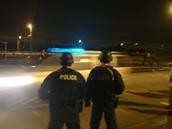Last week, the U.S. government completed one of the largest nuclear recovery operations in history when it helped relocate 341 pounds (154.5 kilograms) of highly enriched uranium -- enough to construct six nuclear weapons -- from a Soviet-era nuclear research reactor in Hungary to a more secure storage site in Russia. The operation was led by the National Nuclear Security Administration (NNSA), a semi-autonomous agency of the U.S. Department of Energy (DOE), and involved the cooperation of Russia, Hungary, Slovenia, the International Atomic Energy Agency (IAEA) and the Euratom Supply Agency. While lauding the Russian and American governments (.pdf) "for their continued cooperation -- despite recent tensions" -- in implementing earlier nonproliferation agreements, former Senator Sam Nunn, the co-chairman of the Nuclear Threat Initiative, warned that "leaders around the world must accelerate work to lock up or remove this dangerous material. We are in a race between cooperation and catastrophe." Due to security and environmental concerns, the caravan of 13 radiation-proof casks containing the used nuclear fuel --
Global Insights: Hungarian Operation Shows Progress, Challenges for Nuclear Cleanout

